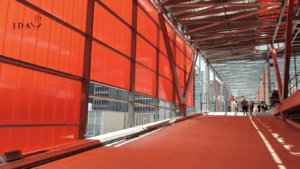After being on the City of Johannesburg’s agenda for 15 years, the state-of-the-art, 50 000 m² Johannesburg International Transport Interchange is nearing completion.
With CCTV cameras throughout the facility, good lighting and wide corridors, the world-class, high-tech Johannesburg International Transport Interchange (JITI) facility is designed to be safe and attractive, transforming long-distance and cross-border travel. “The City of Johannesburg continues to experience an increase in demand for road space. The state-of-the-art JITI will be one of the critical projects that will ensure that efficient mass public transport networks and connections, transit-oriented multi-use precincts, together with strategic land-use planning and zoning regimes are realised so we connect our people to opportunities to live, work and play in the city,” says Cllr Nonhlanhla Makhuba, MMC for Transport. The international transport and shopping hub offers 3 300 m² devoted to retail space. This is to feature everything from large retail outlets, banks, ticketing offices and food courts to informal traders. The facility will also create a variety of economic opportunities and provide social amenities for inner-city users and residents. To banish the long waiting periods faced by long-distance travellers when catching buses and taxis in the inner city, the facility includes a bus terminal for cross-border buses as well as ranking and holding space for 648 taxis, ranking space for 158 taxis, and ranking for 20 buses.Security of the facility will be managed from a control room equipped with a building management system, including CCTV cameras and access control.






